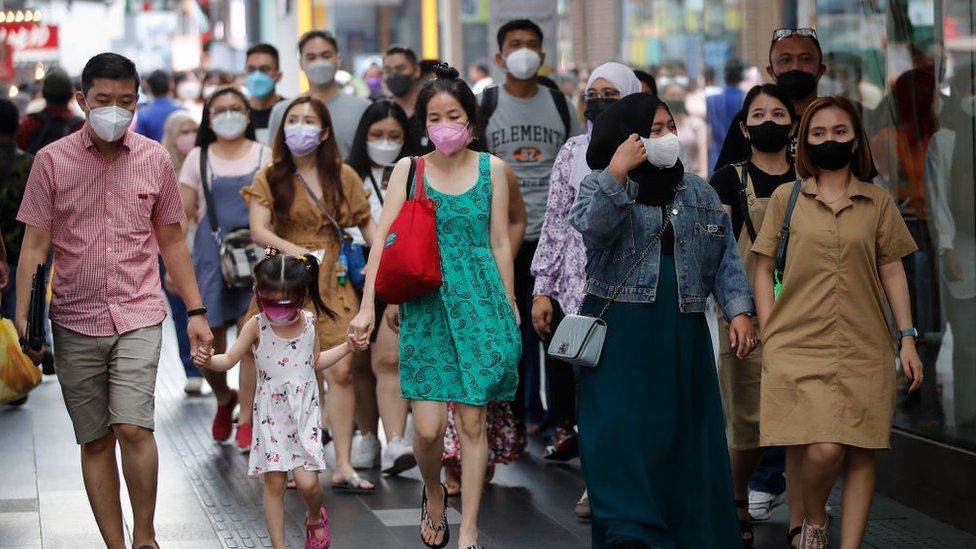



Malaysia's parties have not yet formed a coalition to govern following Saturday's vote
That is because the dynamic of a single incumbent ruling coalition being challenged by an alliance of opposition groups, which had defined Malaysian politics since independence in 1957, was broken at the last election in 2018, when Barisan Nasional and its all-powerful main party UMNO lost power for the first time.
In this year's election there were three, not two, big coalitions contesting and it was unlikely any one of them would win an overall majority in the 222-seat parliament.
What very few predicted was that Barisan Nasional (BN) would perform so badly, winning only 30 seats, half the number it won in 2018.
The UMNO leadership had pushed hard for this election to be held early, rather than next year, because a string of by-election wins had convinced them they might do well enough to regain power.
It was a disastrous miscalculation, leaving the party which ran Malaysia for more than six decades as, at best, a junior partner in a new coalition government.
The beneficiary of UMNO/BN's rout was Perikatan Nasional (PN), a relatively new coalition made up of defectors from UMNO in alliance with the Islamist party PAS.
PN ran a slick campaign, but also appears to have won the support of ethnic Malays in rural areas - the demographic that routinely backs UMNO - thanks to lingering public concern over corruption and over the state of the economy after Covid.
The PN leader Muhyiddin Yassin is seen as a relatively clean leader after he was kicked out of UMNO in 2015 for opposing then-Prime Minister Najib Razak over his involvement in a massive financial scandal known as 1MDB. Mr Najib is now serving a 12-year prison sentence.
Mr Muhyiddin became prime minister in 2020 following the collapse of the reformist coalition which had defeated UMNO two years earlier.
But he was perhaps fortunate to be forced out himself last year and replaced by an UMNO figurehead, Ismail Yaacob Sabri, who has had to deal with this year's inflation crisis.

Muhyiddin Yassin is seen as a relatively clean leader
"The principal underlying reason is the poor economic conditions and inflation which have hit most Malaysian households, still struggling to get out from the effects of the pandemic lockdown" says Ibrahim Suffian from the Merdeka Centre for Opinion Research.
"Second, it was a concern that the highly unpopular BN leader Zahid Hamidi was going to use the election as a means to gain power, and tamper with the judicial system, with respect to the graft cases he is facing, and drop charges against other BN leaders.
"As a result, many Malay Muslim voters gave their support to PN and PAS, as it was seen as a viable alternative to BN."
However, it is the Islamic party PAS which seems to have benefited most, winning 44 seats, the largest number of any party.
The PAS leader Hadi Awang is known for making inflammatory comments, recently suggesting non-Muslims were the root of corruption in Malaysia. Many Malaysians fear he could bring his party's ultra-conservative agenda into the heart of government.
"People are worried that with their new power PAS would try to introduce more Islamic elements into public policy" says James Chin, Professor of Asian Studies at the University of Tasmania.
"Non-Malays are especially fearful because PAS has made it clear it does not believe they should have political rights. I think people worry that if PAS is part of a governing coalition it will interfere in several core areas, for example demanding control of the Ministry of Education and trying to Islamicise the curriculum."

Some non-Malays fear the ultra-conservative PAS party could bring its approach into the heart of government
However PN, even with the 44 seats won by PAS, cannot form a government unless it can persuade UMNO and its BN partners to join it.
As they have been working together in an uneasy coalition since 2020 that should not pose too many problems. But for all its unexpected success, PN did not actually win the largest number of seats.
The bloc which won the most seats was Pakatan Harapan, the reformist alliance led by veteran politician Anwar Ibrahim which made history by ousting UMNO at the last election, but then lost power when the governing coalition collapsed in 2020.
With 82 seats, nine more than PN, PH should in theory be best placed to form a government. Yet there are reasons this is proving difficult.
The largest component of PH is the Democratic Action Party, which won 40 seats, and which gets most of its support from the large ethnic Chinese minority. Reformists who back PH dream of a genuinely multi-racial country where no-one gets special treatment, regardless of ethnic background.
But the reality of Malaysian politics is that race plays a big role, and parties like UMNO, PAS and Mr Muhyiddin's Bersatu can appeal to the ethnic Malay majority by promising to protect the special status and privileges enjoyed by Malays for most of the country's history.
So while Mr Anwar is a popular and charismatic Malay leader, the not-so-subtle suggestion that his coalition poses a threat to "ketuanan Melayu", or Malay supremacy, is a handicap. Some UMNO leaders have refused to consider a partnership with him.
There is also bad blood between the DAP and a 22-seat bloc of parties representing the eastern Malaysian state of Sarawak, whose support could also be instrumental in forming a new administration.

Will Anwar Ibrahim finally become PM, or is it the end of his epic 25-year quest?
All of which explains why the negotiations since the elections results came in on Sunday morning have been so intense, and the Malaysian Agong, or king, has had to extend the deadline to form a government by 24 hours.
If Mr Anwar is unable to do so there would be pressure on him, at the age of 75, to step aside for younger leaders. That would surely mean an end to his epic, 25-year quest to become prime minister, which saw him spend nearly nine years in jail.
Another giant of Malaysian politics felled in this election is Mahathir Mohammad, the country's longest-serving prime minister, who in many ways shaped modern Malaysia.
He made a remarkable comeback in 2018, defeating his old party UMNO at the age of 92 in an unlikely alliance with Mr Anwar.
But the collapse of that alliance in 2020, when Dr Mahathir refused to honour his promise to hand over the premiership to Mr Anwar, damaged his public standing.
Now 97 years old, he insisted on standing for parliament again in what had been a safe seat for him, but was humiliated. He and everyone else in his new party lost their deposits.
Dr Mahathir has loomed large over Malaysian politics for half a century. Perhaps now Malaysians can finally move out from under his shadow.
-- Courtesy of BBC News